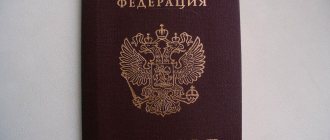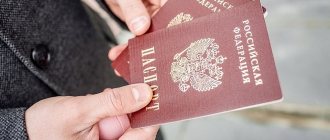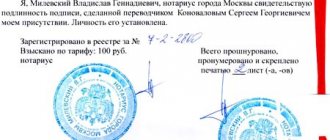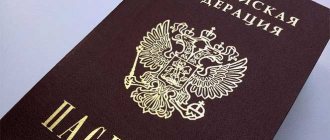Service and diplomatic passports
Special categories of foreign passports are service and diplomatic passports; they are the property of the Russian Federation and are returned after returning from a business trip.
Diplomatic passport of a citizen of the Russian Federation
- one of the main documents identifying a citizen of the Russian Federation, which is used to cross the border of the Russian Federation. Issued only to certain categories of citizens.
Compared to holders of general civil and service passports, holders enjoy the right of facilitated and visa-free entry into a number of countries, in particular, into the Schengen states and India. At the same time, visa requirements may apply to this category of citizens (for example, a visa is required to visit the UK, Canada, USA, a number of Arab states, etc.)
A diplomatic passport is issued by the federal executive body in charge of foreign affairs:
- citizens of the Russian Federation who, in accordance with the 1961 Vienna Convention on Diplomatic Relations and other international treaties of the Russian Federation, when traveling outside the territory of the Russian Federation to perform their official duties, have diplomatic immunity
- to the President of the Russian Federation
- members of the Federation Council and deputies of the State Duma of the Federal Assembly of the Russian Federation (for the term of their powers)
- members of the Government of the Russian Federation
- judges of the Constitutional and Supreme Courts
- To the Prosecutor General
- Chairman of the Central Bank
- persons holding government positions in constituent entities of the Russian Federation
- persons who are sole executive bodies of state corporations
- diplomatic employees and diplomatic couriers of the federal executive body in charge of foreign affairs
- family members (spouse), minor children, disabled adult children) of a citizen of the Russian Federation who has a diplomatic passport and is sent outside the territory of the Russian Federation to an official mission of the Russian Federation or to a representative office of the Russian Federation at an international organization outside the territory of the Russian Federation, living or traveling together with him
Service passport of a citizen of the Russian Federation
- one of the main identification documents used by Russian citizens to enter and exit Russia.
Registration procedure
To obtain this travel document, the company sends an application to the Ministry of Foreign Affairs of the Russian Federation with an explanation that an employee of their company is planning to travel abroad on a working visit at such and such a time.
Application to the Ministry of Foreign Affairs of the Russian Federation for the issuance of a service passport
In addition to the application, a package of documents is also submitted, consisting of:
- Statements. The document indicates the full name of the company, the number under which it is registered in the Ministry of Foreign Affairs, as well as the personal data of the person for whom the “blue” passport is supposed to be issued.
- Account card. This card contains the following information:
- Purpose of the trip.
- Estimated duration of travel and duration of stay in another republic.
- Countries that an employee of a company or organization intends to visit.
- Certificates with photographs. This document must include the following information:
- Last name, first name, patronymic of the person for whom the travel document is “ordered”.
- Address of his actual residence and registration.
- Information from a civil passport: number, series, by whom and when issued.
- Information regarding the presence of other nationalities in foreign countries.
- Information regarding access to information that is encrypted as “secret”.
- Information about a potential obstacle to the departure of a company employee.
- Information about the last foreign business trip (if any).
- Information from a valid foreign passport: series, number, who issued it and when, expiration date.
- Information regarding recent places of employment, training, and military service over the past ten years inclusive.
Stages of document preparation
There are two ways to obtain a residence permit: according to a simplified scheme and in the general manner.
Simplified scheme for obtaining resident status
Intended for the following persons:
- highly qualified specialists;
- Russian-speaking migrants;
- residents of Belarus and Turkmenistan;
- political refugees;
- participants in the resettlement program and close family members (spouses and children) of those who already have a residence permit.
To apply for a residence permit, non-residents do not yet need to obtain a temporary residence permit. The procedure, unlike the standard registration system, takes about 2-3 months.
Video about what the simplified scheme for obtaining a residence permit provides and which categories can apply for it:
General registration
- You can submit documents only after living in Russia on the basis of a temporary residence permit for 12 months. The general processing time for an application is about 6 months.
- Registration takes place at the local branch of the GUVM. This opportunity is also provided through the State Services website. You must contact the authorities no later than 6 months after the expiration of the temporary residence permit.
- The service employee issues a receipt for acceptance of documents.
- After 6 months, a residence permit is issued.
To whom is it issued?
Service documents are not issued by migration services or multifunctional centers; their issuance is under the strict control of the Ministry of Foreign Affairs. They are issued on the basis of an application from the organization where the citizen is officially employed.
According to the Federal Law “On the procedure for leaving the Russian Federation and entering the Russian Federation,” the Ministry of Foreign Affairs issues a service passport of the Russian Federation to the following categories of persons:
- Civil servants.
- Administrative and technical employees.
- Members of the Administration under the President of the Russian Federation.
- Employees of the Federation Council and the State Duma of the Russian Federation.
- Government workers of the Russian Federation.
- Employees of the Constitutional, Supreme and Arbitration Courts.
- Employees of state corporations (Rosatom, Roscosmos, Rusnano, etc.).
- Employees of the Central Bank of the Russian Federation.
- Military personnel serving abroad.
- Full-time employees of diplomatic departments and Russian consulates abroad.
- Representatives of international organizations of Russia abroad.
- Family members of the holder of a service passport, if the duration of the business trip exceeds one year.
Residence permit in Russia, what is it and what advantages does it provide?
For most migrants, obtaining a residence permit is an intermediate step in obtaining citizenship. A residence permit is a document on the basis of which a migrant can live in Russia for 3-5 years.
It is designed in the form of a book, similar in appearance to a passport. It contains the foreigner’s personal data, his photo and signature, date of issue, stamp of the migration service. Why do you need a residence permit?
A migrant who has received a residence permit is automatically granted a number of rights:
- Living in Russia for a long time.
- Freedom of movement throughout the country.
- The right to travel abroad.
- Employment in any region of the Russian Federation.
- The ability to use banking services, including taking out loans.
- The right to benefit from free medical care.
- The right to receive benefits, pensions, and become a participant in government social programs.
- Buy real estate and register its ownership.
- Opportunity to be elected to local authorities.
- The ability to send invitations to enter Russia to your relatives from another country.
There are also some legal restrictions:
- Lack of the right to be elected to local authorities and to vote.
- Foreigners cannot serve in the Russian army, be members of the crew of a Russian sea vessel, or work as a pilot of passenger aircraft.
- Cannot enter “restricted areas”.
What do blue and green passports mean?
The document looks like a passport - the same cover, size and content structure. You can find out what a residence permit is and what it looks like in the photo here.
Residence permits vary in color:
- with a green cover is issued to stateless people;
- with a blue cover - for foreign citizens.
Read about the difference in obtaining a residence permit in the Russian Federation for a foreign citizen and a stateless person here.
The contents of both documents are the same:
- Photo.
- Document Number.
- Date of registration.
- Validity.
- Full name, date of birth and gender.
- Place of registration.
- Address of the authority that issued the residence permit and signature of the official.
- Information about minor children.
- Citizenship of the country (if the owner of the document has one).
A migrant who has received a residence permit receives Russian resident status.
This means that it is automatically subject to Russian law. Reference! A residence permit will need to be issued only once, and then it must be renewed every 3-5 years (depending on the established validity period).
Service passport of a citizen of the Russian Federation
In the Russian Federation, this is a document, a type of foreign passport, which allows entry into Russia and exit outside the state.
A service passport is capable of identifying the identity of its owner. The fact is that this document belongs directly to the state itself. Therefore, upon expiration of its validity period (that is, at the end of the business trip), the citizen must return to his home country, providing the document to the organization that sent him on a business trip to another country.
As for the possible validity period of a service passport, there are certain restrictions: a foreign document is issued for a period of no more than five years, just like.
Passport creative
Passports have not changed much over the past decades, but some countries have still begun to get creative with their main document.
For example, the Finnish passport is made like a FlipBook - if you quickly turn the pages, you can see a moose strolling.
The UK has a unique type of passport - the Queen's Diplomatic Courier Passport, which serves as identification for workers delivering important information to consulates and embassies in other countries. A passport gives you unhindered travel around the world, first class flights and meetings with influential people.
In addition to the four main colors, others are occasionally used for passports. Canadian citizens, for example, are issued white passports as temporary documents. Norway offers passports in a variety of colors with minimalist designs.
Second passport
A citizen of the Russian Federation can legally have two valid international passports at the same time[1]. This provides some conveniences for frequent travelers:
- During the visa process, the passport is submitted to the consulate. A second passport means you don't have to wait to get a visa for other trips or to apply for other visas.
- A number of countries have a negative attitude towards a traveler who has visited states that are unfriendly to the country of entry, even to the point of denying entry (for example, entry into Iran may be denied to a person who has notes in his passport about visiting Israel). Having a second passport, you can hide the fact of such visits from immigration officials.
A special feature of the second passport is that it can only be biometric. Such a passport is issued for an independent validity period of 10 years (regardless of the expiration date of the first passport).
Privilege
A service passport does not provide any privileges. It is issued only to citizens who do not have any legal restrictions on traveling abroad. A service passport imposes additional responsibility on its owner, since he represents Russia at the international level. This document regulates business visits; it is not intended for holidays outside the Russian Federation.
Russian foreign policy seeks to conclude an agreement on visa-free entry into the European Union for holders of service passports. But so far the attempts remain unsuccessful.
The European Community believes that holders of Russian blue passports exceed their authority and do not use the documents in strict accordance with their intended purpose. This opinion is justified by the presence of a suspiciously large number of documents on the territory of the Russian Federation.
According to official data, in Russia there are about 15,000 valid passports for 140 million inhabitants, while in Europe there are 20,000 documents for 500 million inhabitants of the European Union.
EU authorities aim to ease visa requirements for students, scientists, researchers, journalists and businessmen. It is these categories of citizens, in their opinion, that are capable of strengthening international ties.
But in matters of acquiring a visa stamp, the procedure for the applicant is simplified by the fact that:
- The sending organization undertakes the process of preparing and issuing a visa.
- The service passport determines the purpose of the trip, which influences the consul’s positive response.
- Albania, Angola, Bulgaria, Bosnia and Herzegovina, Hungary, India, Iran, Cyprus, Cambodia, Mexico, Panama, South Africa, South Korea and a number of other countries give the holders of such documents the right to enter and stay on their territory without obtaining a visa.
A service passport is a special identification document valid only during work trips abroad. The holder of this document bears great responsibility while outside Russia and acts in accordance with the requirements of the law and the policies of the sending organization.
Official documents are kept under strict records, which helps the Russian Foreign Ministry monitor the activities of top-level officials.
Related topics:
- When is a Russian passport invalid? The passport turns into... Let's leave out the obvious things, such as torn, burnt or gnawed by animals - what...
- Passport in 1 day How to apply for a foreign ID card if your registration is in another city? This section is unlikely to interest you,…
- Restore a passport after loss A passport was stolen... what to do? The loss of a passport of a citizen of the Russian Federation is an event fraught with unpleasant consequences. What fines...
What is a service ID card
In fact, this is one of the types of foreign travel document, on the basis of which an official can cross the Russian border. In addition to the fact that the certificate informs that the bearer of such a document is performing some kind of state mission, it also identifies his identity.
This document belongs directly to the state that issued it. Therefore, as soon as its validity period expires, a sign of which will be the end of the business trip, the owner must deposit it with the company that sent him on a trip abroad.
In general, the validity of the certificate is limited to five years. The passport is issued by the Ministry of Foreign Affairs of the Russian Federation. Today, civil servants have the opportunity to receive a new document with an electronic chip, like all other Russian citizens.
Which passports are suitable for comfortable entry into Europe?
In addition to the civilian, so-called red passport, for traveling outside Russia there are also a diplomatic passport, a service passport and a sailor’s passport.
Diplomatic passports (green) are issued to those who have diplomatic immunity when traveling outside Russia to perform official duties. These are diplomatic employees of the federal executive body, the president, members of the Federation Council, State Duma deputies and other persons in agreement (for example, the chairman of the Central Election Commission, judges of the Supreme Court, heads of departments of the FSB, the wife of the presidential press secretary, etc.).
Family members (spouse, minor children, disabled adult children) who live or travel together with citizens who have diplomatic passports and are sent to an official mission of the Russian Federation abroad, including an official mission to an international organization, are also entitled to a “green passport” . In accordance with the 1961 Vienna Convention on Diplomatic Relations, diplomatic passports provide a number of significant advantages: immunity from prosecution, inviolability of work and private residence, car, luggage, rapid border crossing without queues or inspection, and others.
In 2006, visa-free entry into the European Union was opened for holders of such passports. Service passports (blue) are intended for full-time employees of diplomatic missions and consular offices, official representative offices of federal executive bodies located outside the territory of the Russian Federation, military personnel serving abroad, as well as employees of the Central Bank and employees of state corporations. Citizens holding government positions in the Russian Federation or government positions in constituent entities of the Russian Federation, as well as employees of medical and organizational and technical services accompanying them on business trips abroad, are also entitled to a service passport.
Their family members apply for a “blue passport” if the duration of the business trip exceeds one year. Diplomatic and service passports are the property of the Russian Federation.
They are issued by the Ministry of Foreign Affairs for a period of up to five years. After the completion of the official business trip, passports must be returned to the organization that sent the citizen outside the country. A seafarer's passport is issued by the Ministry of Transport to Russian citizens working on a ship sailing abroad or sent by a Russian shipowner to work on a foreign ship.
A seafarer's passport is issued by the Ministry of Transport to Russian citizens working on a ship sailing abroad or sent by a Russian shipowner to work on a foreign ship. A seafarer's identity card can also be obtained by cadets of educational institutions and employees of enterprises under the jurisdiction of federal executive authorities sent to ships to perform official assignments.
Prepared by Nikita GIRIN and Diana KHACHATRYAN
Negotiations with the EU on a visa-free regime
The desire of the Russian authorities to achieve indefinite visa-free stay in the European Union for holders of service passports was the main reason for preventing the conclusion of an agreement between the Russian Federation and the EU on simplifying the visa regime for individual citizens. Brussels doubts that in Russia service passports are issued and used in strict accordance with the rules and notes an excessive number of such passports in our country (according to official data, there are about 15 thousand valid passports of this category in Russia with a population of 140 million versus 20 thousand in the European Union with a population of half a billion ). In addition, the EU wanted to abolish the visa regime for students, scientists, representatives of NGOs, journalists and businessmen. It is these people, as the EU believes, who play the most important role in strengthening ties between peoples. “We hoped first of all to make life easier for ordinary citizens, and not for officials and deputies,” explained a source in the EU. [2].
Notes[ | ]
- ↑ 12
Federal Law “On the procedure for leaving the Russian Federation and entering the Russian Federation” dated August 15, 1996 N 114-FZ - Expelled from the Olympic program on February 19, 2013 (Russian). kommersant.ru
. Access date: November 13, 2021. - Blue passports are for white people. Russia and the EU cannot agree on easing the visa-free regime: Europe wants to make life easier for ordinary citizens, and Russia wants to make life easier for its own officials, 12/5/2012 (Russian). www.novayagazeta.ru
. Access date: November 13, 2021.









